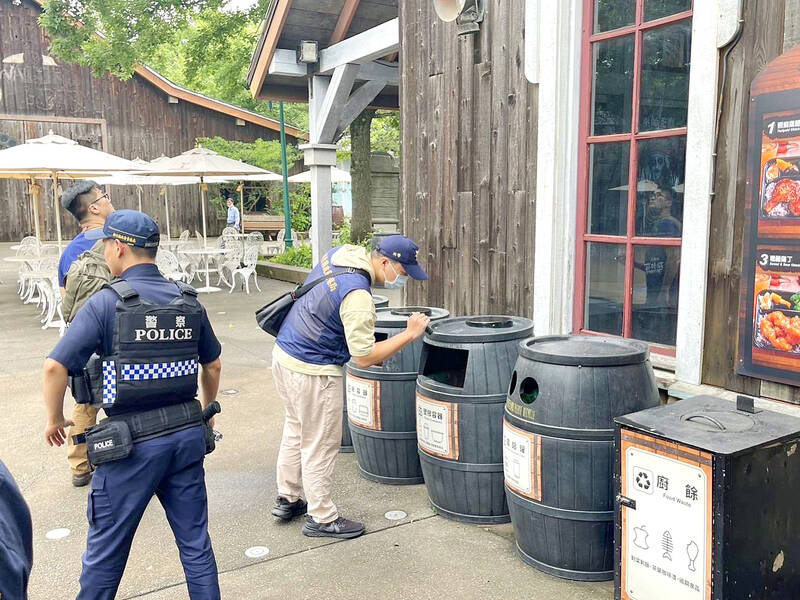More than 190 e-mailed bomb threats received since September last year were traced and identified as coming from abroad, the Criminal Investigation Bureau (CIB) said on Saturday.
The bureau said all of the threats were false alarms and no bombs have been found by the police to date.
The string of bomb threats that began last year continued on Saturday. Hsinchu County’s Leofoo Village Theme Park, New Taipei City’s National Taiwan Library and Taichung’s Education Bureau all received similar threats, but police did not find any suspicious objects.

Photo courtesy of Hsinchu county police
The culprits have threatened to detonate bombs in areas such as public transport stations with the aim of causing chaos, the bureau said.
The e-mailed threats have been sent using the names of politicians, celebrities or anime characters to hamper the investigation, it said.
The culprits have endangered public safety “by putting the public in fear of injury to life, body, or property,” the bureau said, citing the Criminal Code.
If convicted, the perpetrators could be sentenced to up to two years in jail, it said.
The bureau advised people who receive such threats to remain calm and notify the police right away.
Police said the Internet protocol addresses the threats were traced to were from other countries, including the US, Japan and Indonesia, but not China.
Those responsible for the threats could have used a virtual private network (VPN), police said.
Investigators would try to identify the suspects by filtering the words they have used, police said.
Meanwhile, the bureau said it is continuing to target Chinese national Zhang Haichuan (張海川) in a separate case.
Zhang, who previously studied in Taiwan, allegedly sent 235 threatening e-mails to public transport systems in Taiwan between September 2021 and Tuesday, it said.
The Taichung District Prosecutors’ Office on June 14 last year asked Chinese law enforcement authorities to assist in solving the case.

The first global hotel Keys Selection by the Michelin Guide includes four hotels in Taiwan, Michelin announced yesterday. All four received the “Michelin One Key,” indicating guests are to experience a “very special stay” at any of the locations as the establishments are “a true gem with personality. Service always goes the extra mile, and the hotel provides much more than others in its price range.” Of the four hotels, three are located in Taipei and one in Taichung. In Taipei, the One Key accolades were awarded to the Capella Taipei, Kimpton Da An Taipei and Mandarin Oriental Taipei. Capella Taipei was described by

EVA Airways today confirmed the death of a flight attendant on Saturday upon their return to Taiwan and said an internal investigation has been launched, as criticism mounted over a social media post accusing the airline of failing to offer sufficient employee protections. According to the post, the flight attendant complained of feeling sick on board a flight, but was unable to take sick leave or access medical care. The crew member allegedly did not receive assistance from the chief purser, who failed to heed their requests for medical attention or call an ambulance once the flight landed, the post said. As sick

The Taichung District Court yesterday confirmed its final ruling that the marriage between teenage heir Lai (賴) and a man surnamed Hsia (夏) was legally invalid, preventing Hsia from inheriting Lai’s NT$500 million (US$16.37 million) estate. The court confirmed that Hsia chose not to appeal the civil judgement after the court handed down its ruling in June, making the decision final. In the June ruling, the court said that Lai, 18, and Hsia, 26, showed “no mutual admiration before the marriage” and that their interactions were “distant and unfamiliar.” The judge concluded that the couple lacked the “true intention of

INDUSTRY: Beijing’s latest export measures go beyond targeting the US and would likely affect any country that uses Chinese rare earths or related tech, an academic said Taiwanese industries could face significant disruption from China’s newly tightened export controls on rare earth elements, as much of Taiwan’s supply indirectly depends on Chinese materials processed in Japan, a local expert said yesterday. Kristy Hsu (徐遵慈), director of the Taiwan ASEAN Studies Center at the Chung-Hua Institution for Economic Research, said that China’s latest export measures go far beyond targeting the US and would likely affect any country that uses Chinese rare earths or related technologies. With Japan and Southeast Asian countries among those expected to be hit, Taiwan could feel the impact through its reliance on Japanese-made semi-finished products and